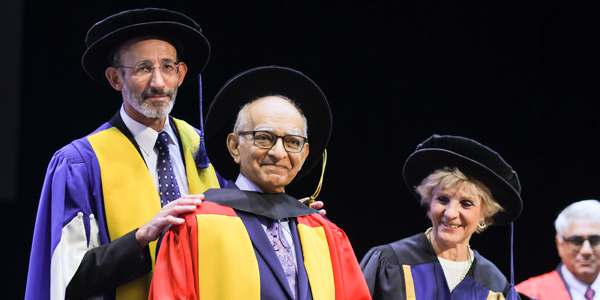How South Africa averted a nuclear catastrophe
- Wits University
The world took a long time to challenge apartheid SA’s nuclear programme that aimed to deter liberation throughout southern Africa.
The story of how South Africa averted a nuclear catastrophe was narrated to Faculty of Science graduates this week by Ambassador Abdul Minty, when he was awarded an honorary doctorate in science for his contributions to peace and for the use of science for development.
“All South Africa’s major trading partners continued to claim that their nuclear cooperation with South Africa was only for peaceful purposes and that the Pretoria regime did not have any nuclear weapons capability,” said Minty, a liberation stalwart. “In fact, certain Western countries even argued at times against further sanctions and other anti-apartheid measures, because they claimed that the apartheid regime was desperate and could unleash a nuclear catastrophe.”

Minty left South Africa in 1958 for Britain, as a young man in his 20s, to join the anti-apartheid movement. Amongst his many contributions, he was instrumental in exposing the apartheid government’s nuclear armaments programme. In 1969, he published a booklet titled South Africa’s Defence Strategy, which gained global attention. However, it was only in 1977, with the discovery of the secret Kalahari nuclear test site through satellite pictures, that the world learnt the truth about the former South African government’s ‘harmless’ programme.
Through Minty’s efforts and those of others, South Africa is today lauded as the first and only country in the world to have voluntarily dismantled nuclear armaments that it had itself developed.
Of his accolade from Wits, Minty said the honour celebrates “hundreds and thousands of known and unknown persons throughout the world and the African, Asian and Caribbean countries and others for their brave and often long struggle to eliminate the apartheid system and create conditions for peace and development.” Read Minty's speech.
Wits University awards honorary doctorates to individuals who have distinguished themselves for their contribution to society. The University thus saw it fitting to recognise Minty for his “life-long contributions to exposing the apartheid regime’s nuclear armaments programme; the promotion of non-proliferation of nuclear arms; the role he played in the voluntary dismantling of nuclear armaments in South Africa; his leadership and activism to promote atomic science for peace.”
足球竞彩app排名 Ambassador Minty
Minty currently serves as the Board of Governors of the International Atomic Energy Agency. He has represented South Africa in many capacities and returned to a democratic country in 1995.
He was born in Haartebeesfontein in what is now the Limpopo Province on 31 October 1933, and grew up in Johannesburg. He holds a BSc (Econ) degree in International Relations (University College, London) and a MSc (Econ) in International Relations from the same institution.
Between 1962 and 1991, Minty was the Honorary Secretary of the British Anti-Apartheid Movement, and played a central role in exposing and isolating the apartheid state and supporting the struggle against apartheid. Among others, he worked for the International Development and Aid Fund, which provided legal and humanitarian support for those fighting against the apartheid state. Minty also led lobbying of the International Olympic Committee (IOC), which was instrumental in securing South Africa’s suspension from the Olympic movement, and the wider sports boycott against the apartheid state. Read the full citation detailing his work.

